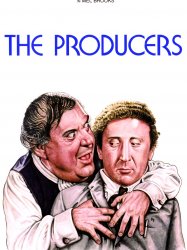Ralph Rosenblum is a Director, Associate Producer and Editor American born on 13 october 1925 at Brooklyn (USA)

Ralph Rosenblum (October 13, 1925 – September 6, 1995) was an American film editor who worked extensively with the directors Sidney Lumet and Woody Allen. He won the 1977 BAFTA Award for Best Editing for his work on Annie Hall, and published an influential memoir When the Shooting Stops, the Cutting Begins: A Film Editor's Story (which is still in print).
Towards the end of the Second World War, Rosenblum worked as a filmmaking apprentice in the U. S. Office of War Information; among his mentors there were Sidney Meyers and Helen van Dongen. Following the war he became van Dongen's assistant while she was editing Robert Flaherty's film Louisiana Story (1948). Much of Rosenblum's work in the 1950s and early 1960s was in television; he worked on shows such as The Search, Omnibus, The Guy Lombardo Show, and The Patty Duke Show. With Sid Katz and Gene Milford, he formed a company, MKR Films, that provided editorial services for television shows, spots, and corporate films.
In the 1960s, Rosenblum edited five films directed by Sidney Lumet, starting with Long Day's Journey into Night (1962). These films, which were all serious dramas, were very important to Rosenblum's career; as John Gallagher has noted,Fail-Safe and The Pawnbroker demonstrated Rosenblum's editorial finesse. The montage ending of Fail Safe, depicting the last few moments of life on earth, and the use of concentration camp flashbacks in The Pawnbroker, brought Rosenblum his first industry recognition.
Paul Monaco has summarized Rosenblum's editing innovations on The Pawnbroker, as well as their influence, as follows, "In his work on The Pawnbroker, Rosenblum imitated devices from several French films of the previous decade, but he also extended them. Like Dede Allen, Rosenblum broke editing conventions and rules. More importantly, and like her also, his innovations shifted editing away from its traditional reliance on telling a story to the creation of a new and penetrating subjectivity in the feature film."
In 1966, Rosenblum was nominated for an American Cinema Editors "Eddie" award (Best Editing of a Feature Film) for A Thousand Clowns (1965), which was directed by Fred Coe.
In 1968, Rosenblum was hired as an "editorial consultant" to help a young Woody Allen hone a large amount of footage into what became Allen's first film, the mockumentary Take the Money and Run. Rosenblum went on to edit the next five of Allen's films, including Annie Hall, for which he won the 1977 BAFTA Award for Best Editing (with Wendy Greene Bricmont). Interiors (1978) was Rosenblum's last film with Allen. Rosenblum declined to edit Allen's 1979 film, Manhattan. Susan E. Morse, who had been Rosenblum's assistant editor on several of Allen's films, became his successor and edited Allen's films for the ensuing twenty years.
In 1979, Rosenblum published a book written with Robert Karen, When the Shooting Stops, the Cutting Begins: A Film Editor's Story. Gallagher described the importance of this book as follows:
Ralph Rosenblum did a service to editors everywhere with the 1979 publication of his memoir When the Shooting Stops . . . the Cutting Begins, a popular volume which gave the first insider's explanation of what really goes into film editing. ... In the book Rosenblum revealed that he had saved several films by creatively reshaping the footage, such as William Friedkin's The Night They Raided Minsky's and Woody Allen's first major film as a director, Take the Money and Run. Rosenblum's revelations helped bring credit to the film editing profession, and forced scholars to reconsider editorial contributions.
Rosenblum worked as a director for about five years, commencing with the documentary film Acting Out (1980). His films included Summer Solstice (1981), which was made for television and which was actor Henry Fonda's last film.
Rosenblum taught film and film editing at Columbia University for a number of years until his death in 1995.
En particulier, il collabore à plusieurs réalisations de Sidney Lumet (ex. : Point limite en 1964) et de Woody Allen (ex. : Annie Hall en 1977). Citons également Des clowns par milliers de Fred Coe (1965) et Né pour vaincre d'Ivan Passer (1971).
Il est également monteur pour la télévision entre 1956 et 1976, sur deux téléfilms et cinq séries (dont soixante-douze épisodes de The Patty Duke Show , 1963-1965).
Par ailleurs, il est producteur de quatre films, dont Des clowns par milliers précité et Bananas de Woody Allen (1971). Enfin, il est réalisateur au cinéma (trois films) et à la télévision (trois séries et trois téléfilms, dont Summer Solstice en 1981).
Le film Annie Hall précité permet à Ralph Rosenblum de gagner en 1978 le British Academy Film Award du meilleur montage.
Source : Wikidata
Ralph Rosenblum

- Infos
- Photos
- Best films
- Family
- Characters
- Awards
Nationality USA
Birth 13 october 1925 at Brooklyn (USA)
Death 6 september 1995 (at 69 years) at Manhattan (USA)
Birth 13 october 1925 at Brooklyn (USA)
Death 6 september 1995 (at 69 years) at Manhattan (USA)
Ralph Rosenblum (October 13, 1925 – September 6, 1995) was an American film editor who worked extensively with the directors Sidney Lumet and Woody Allen. He won the 1977 BAFTA Award for Best Editing for his work on Annie Hall, and published an influential memoir When the Shooting Stops, the Cutting Begins: A Film Editor's Story (which is still in print).
Towards the end of the Second World War, Rosenblum worked as a filmmaking apprentice in the U. S. Office of War Information; among his mentors there were Sidney Meyers and Helen van Dongen. Following the war he became van Dongen's assistant while she was editing Robert Flaherty's film Louisiana Story (1948). Much of Rosenblum's work in the 1950s and early 1960s was in television; he worked on shows such as The Search, Omnibus, The Guy Lombardo Show, and The Patty Duke Show. With Sid Katz and Gene Milford, he formed a company, MKR Films, that provided editorial services for television shows, spots, and corporate films.
In the 1960s, Rosenblum edited five films directed by Sidney Lumet, starting with Long Day's Journey into Night (1962). These films, which were all serious dramas, were very important to Rosenblum's career; as John Gallagher has noted,Fail-Safe and The Pawnbroker demonstrated Rosenblum's editorial finesse. The montage ending of Fail Safe, depicting the last few moments of life on earth, and the use of concentration camp flashbacks in The Pawnbroker, brought Rosenblum his first industry recognition.
Paul Monaco has summarized Rosenblum's editing innovations on The Pawnbroker, as well as their influence, as follows, "In his work on The Pawnbroker, Rosenblum imitated devices from several French films of the previous decade, but he also extended them. Like Dede Allen, Rosenblum broke editing conventions and rules. More importantly, and like her also, his innovations shifted editing away from its traditional reliance on telling a story to the creation of a new and penetrating subjectivity in the feature film."
In 1966, Rosenblum was nominated for an American Cinema Editors "Eddie" award (Best Editing of a Feature Film) for A Thousand Clowns (1965), which was directed by Fred Coe.
In 1968, Rosenblum was hired as an "editorial consultant" to help a young Woody Allen hone a large amount of footage into what became Allen's first film, the mockumentary Take the Money and Run. Rosenblum went on to edit the next five of Allen's films, including Annie Hall, for which he won the 1977 BAFTA Award for Best Editing (with Wendy Greene Bricmont). Interiors (1978) was Rosenblum's last film with Allen. Rosenblum declined to edit Allen's 1979 film, Manhattan. Susan E. Morse, who had been Rosenblum's assistant editor on several of Allen's films, became his successor and edited Allen's films for the ensuing twenty years.
In 1979, Rosenblum published a book written with Robert Karen, When the Shooting Stops, the Cutting Begins: A Film Editor's Story. Gallagher described the importance of this book as follows:
Ralph Rosenblum did a service to editors everywhere with the 1979 publication of his memoir When the Shooting Stops . . . the Cutting Begins, a popular volume which gave the first insider's explanation of what really goes into film editing. ... In the book Rosenblum revealed that he had saved several films by creatively reshaping the footage, such as William Friedkin's The Night They Raided Minsky's and Woody Allen's first major film as a director, Take the Money and Run. Rosenblum's revelations helped bring credit to the film editing profession, and forced scholars to reconsider editorial contributions.
Rosenblum worked as a director for about five years, commencing with the documentary film Acting Out (1980). His films included Summer Solstice (1981), which was made for television and which was actor Henry Fonda's last film.
Rosenblum taught film and film editing at Columbia University for a number of years until his death in 1995.
Biography
Comme monteur, au cinéma, Ralph Rosenblum débute en tant qu'assistant sur Louisiana Story de Robert Flaherty (1948). Suivent trente-cinq autres films américains entre 1958 et 1982.En particulier, il collabore à plusieurs réalisations de Sidney Lumet (ex. : Point limite en 1964) et de Woody Allen (ex. : Annie Hall en 1977). Citons également Des clowns par milliers de Fred Coe (1965) et Né pour vaincre d'Ivan Passer (1971).
Il est également monteur pour la télévision entre 1956 et 1976, sur deux téléfilms et cinq séries (dont soixante-douze épisodes de The Patty Duke Show , 1963-1965).
Par ailleurs, il est producteur de quatre films, dont Des clowns par milliers précité et Bananas de Woody Allen (1971). Enfin, il est réalisateur au cinéma (trois films) et à la télévision (trois séries et trois téléfilms, dont Summer Solstice en 1981).
Le film Annie Hall précité permet à Ralph Rosenblum de gagner en 1978 le British Academy Film Award du meilleur montage.
Best films
Usually with
Filmography of Ralph Rosenblum (34 films)
Director

Summer Solstice (1980)
Directed by Ralph Rosenblum
Genres Drama, Romance
Actors Henry Fonda, Myrna Loy, Stephen Collins, Lindsay Crouse
Rating71%






Fore Play (1975)
, 1h15Directed by John G. Avildsen, Ralph Rosenblum, Bruce Malmuth
Origin USA
Genres Comedy
Actors Zero Mostel, Estelle Parsons, Pat Paulsen, Jerry Orbach, Paul Dooley, George S. Irving
Rating40%





The film is split into three segments: the first involves a man buying an animate sex doll and his many failed attempts to bed it. In the second story, a man suffering from writer's block find his muse by undressing various women. Finally, the third story involves the President of the United States, whose daughter is kidnapped and will be killed unless the President and his wife have sex on national television.
Producer

Sleeper (1973)
, 1h29Directed by Woody Allen
Origin USA
Genres Science fiction, Comedy, Romance, Comic science fiction
Themes Films about religion, Comedy science fiction films, Films set in the future, Political films, Films about Jews and Judaism, Dystopian films, Robot films
Actors Diane Keaton, Woody Allen, John Beck, Mews Small, Bartlett Robinson, Don Keefer
Roles Associate Producer
Rating70%





Miles Monroe (Woody Allen), a jazz musician and owner of the "Happy Carrot" health-food store in 1973, is subjected to cryopreservation without his consent, and not revived for 200 years. The scientists who revive him are members of a rebellion: 22nd-century America seems to be a police state, ruled by a dictator about to implement a secret plan known as the "Aries Project". The rebels hope to use Miles as a spy to infiltrate the Aries Project, because he is the only member of this society without a known biometric identity.
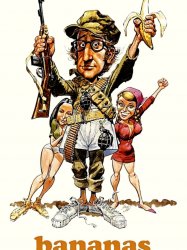
Bananas (1971)
, 1h22Directed by Woody Allen
Origin USA
Genres Comedy
Themes Seafaring films, Monde imaginaire, Films about sexuality, Transport films, LGBT-related films, Political films, Films about Latin American military dictatorships, LGBT-related films, LGBT-related film
Actors Louise Lasser, Woody Allen, Carlos Montalbán, Sylvester Stallone, Dan Frazer, Jacobo Morales
Roles Associate Producer
Rating68%





Fielding Mellish (Woody Allen) is the main character, but he does not appear until after the opening credits. The cold open, which featured the assassination of the president of the fictional "banana republic" of San Marcos that completed a coup d'état bringing Gen. Emilio Molina Vargas (Carlos Montalban) to power, sets up the situation that Mellish would enter later in the movie. The scene was in the form of a championship boxing telecast on Wide World of Sports, with Don Dunphy as the host and Howard Cosell as the commentator.

A Thousand Clowns (1965)
, 1h58Origin USA
Genres Drama, Comedy, Comedy-drama, Romance
Themes Films based on plays
Actors Jason Robards, Barbara Harris, Martin Balsam, Gene Saks, William Daniels, Philip Bruns
Roles Associate Producer
Rating72%





Unemployed television writer Murray Burns (Jason Robards) lives in a cluttered New York City studio apartment with his 12-year-old nephew, Nick (Barry Gordon). Murray has been unemployed for five months after quitting his previous job: writing jokes for a children's television show called Chuckles the Chipmunk. Nick, the illegitimate son of Murray's sister, was left with Murray seven years earlier.
Editor

Directed by Sidney Lumet
Genres Drama
Actors William Hutt, Martha Henry, Peter Donaldson, Tom McCamus, Martha Burns, Jason Robards
Rating4%





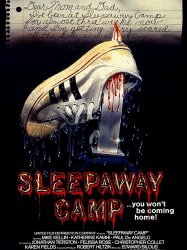
Sleepaway Camp (1983)
, 1h27Directed by Robert Hiltzik
Origin USA
Genres Thriller, Horror, Slasher
Themes Films about sexuality, Transport films, LGBT-related films, Transgender in film, Serial killer films, Road movies, Teen LGBT-related films, LGBT-related films, LGBT-related film
Actors Mike Kellin, Jonathan Tiersten, Katherine Kamhi, Felissa Rose, Christopher Collet, Robert Earl Jones
Rating62%





In 1975, John Baker and his lover, Lenny, take John's children Angela and Peter on a boating trip. After the boat capsizes, John and the children attempt to swim ashore where Lenny is waiting for them, but they swim into the path of a reckless motorboat driver and are struck. We see that John and Peter are killed.
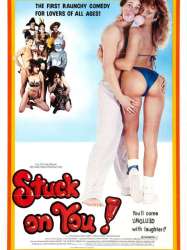
Stuck on You! (1982)
, 1h30Directed by Lloyd Kaufman
Genres Comedy, Fantasy, Romance
Themes Films about sexuality, Erotic films, Sexploitation films
Actors Irwin Corey, Patricia Tallman
Roles Editor
Rating41%





The film, supposedly inspired by the writings of Tom Lehrer and Stan Freberg, follows

Interiors (1978)
, 1h33Directed by Woody Allen
Origin USA
Genres Drama, Romance
Themes Films about families, Medical-themed films, Films about suicide, Films about psychiatry
Actors Diane Keaton, Mary Beth Hurt, Geraldine Page, Maureen Stapleton, Richard Jordan, Kristin Griffith
Roles Editor
Rating72%





The film centers around the three children of Arthur (E. G. Marshall), a corporate attorney, and Eve (Geraldine Page), an interior decorator. Renata (Diane Keaton) is a poet whose husband Frederick, a struggling writer, feels eclipsed by her success. Flyn (Kristin Griffith) is a vain actress who is away most of the time filming; the low quality of her films is an object of ridicule behind her back. Joey (Mary Beth Hurt), who is in a relationship with Mike (Sam Waterston), cannot settle on a career, and resents her mother for favoring Renata, while Renata resents their father's concern over Joey's lack of direction.
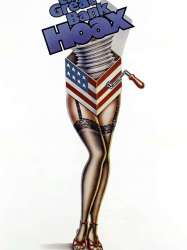
The Great Bank Hoax (1978)
, 1h27Origin USA
Genres Comedy
Actors Richard Basehart, Ned Beatty, Burgess Meredith, Michael Murphy, Paul Sand, Constance Forslund
Roles Editor
Rating51%






North Star: Mark di Suvero (1978)
, 54minutesGenres Documentary
Themes Documentary films about the visual arts
Roles Editorial Services

Annie Hall (1977)
, 1h33Directed by Woody Allen
Origin USA
Genres Drama, Comedy, Romantic comedy, Romance
Themes Films about films, Films about religion, Films about Jews and Judaism
Actors Woody Allen, Diane Keaton, Tony Roberts, Carol Kane, Shelley Duvall, Paul Simon
Roles Editor
Rating79%





The comedian Alvy Singer (Woody Allen) is trying to understand why his relationship with Annie Hall (Diane Keaton) ended a year ago. Growing up in New York, he vexed his mother with impossible questions about the emptiness of existence, but he was precocious about his innocent sexual curiosity.

Love and Death (1975)
, 1h25Directed by Woody Allen
Origin USA
Genres War, Comedy, Historical
Themes Political films, Histoire de France, Napoleonic Wars films, French Revolution films
Actors Woody Allen, Diane Keaton, Jessica Harper, Georges Adet, Olga Georges-Picot, James Tolkan
Roles Editor
Rating75%





When Napoleon (James Tolkan) invades Austria during the Napoleonic Wars, Boris Grushenko (Woody Allen), a coward and pacifist scholar, is forced to enlist in the Russian Army. Desperate and disappointed after hearing the news that Sonja (Diane Keaton), his cousin twice removed, is to wed a herring merchant, he inadvertently becomes a war hero. He returns and marries the recently widowed Sonja, who does not want to marry Boris, but promises him that she will when she thinks that he is about to be killed in a duel. Their marriage is filled with philosophical debates, and no money. Their life together is interrupted when Napoleon invades the Russian Empire. Boris wants to flee but his wife, angered that the invasion will interfere with their plans to start a family that year, conceives a plot to assassinate Napoleon at his headquarters in Moscow. Boris and Sonja debate the matter with some degree of philosophical double-talk, and Boris reluctantly goes along with it. They fail to kill Napoleon and Sonja escapes arrest while Boris is executed, despite being told by a vision that he will be pardoned.

Lovin' Molly (1974)
, 1h38Directed by Sidney Lumet
Origin USA
Genres Drama, Romance
Actors Anthony Perkins, Beau Bridges, Blythe Danner, Susan Sarandon, Ed Binns, Marilyn Burns
Roles Editorial Consultant
Rating55%





Over a span of nearly 40 years, Gid and Johnny, a pair of Texas farm boys, compete for the affections of Molly Taylor, a free spirit who cares for both of them. The story is told by three consecutive segments which is narrated by one of the three lead roles.

Sleeper (1973)
, 1h29Directed by Woody Allen
Origin USA
Genres Science fiction, Comedy, Romance, Comic science fiction
Themes Films about religion, Comedy science fiction films, Films set in the future, Political films, Films about Jews and Judaism, Dystopian films, Robot films
Actors Diane Keaton, Woody Allen, John Beck, Mews Small, Bartlett Robinson, Don Keefer
Roles Editor
Rating70%





Miles Monroe (Woody Allen), a jazz musician and owner of the "Happy Carrot" health-food store in 1973, is subjected to cryopreservation without his consent, and not revived for 200 years. The scientists who revive him are members of a rebellion: 22nd-century America seems to be a police state, ruled by a dictator about to implement a secret plan known as the "Aries Project". The rebels hope to use Miles as a spy to infiltrate the Aries Project, because he is the only member of this society without a known biometric identity.
 Connection
Connection
